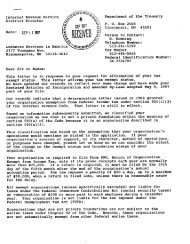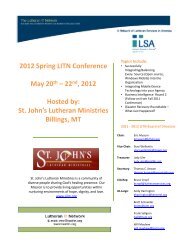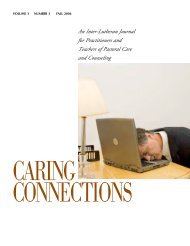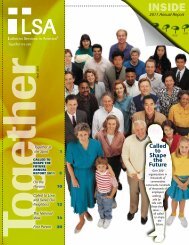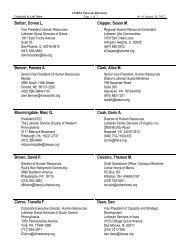HIPAA and Pastoral Care: Practical Issues and Strategies
HIPAA and Pastoral Care: Practical Issues and Strategies
HIPAA and Pastoral Care: Practical Issues and Strategies
- No tags were found...
You also want an ePaper? Increase the reach of your titles
YUMPU automatically turns print PDFs into web optimized ePapers that Google loves.
July 2004<strong>HIPAA</strong> <strong>and</strong> <strong>Pastoral</strong> <strong>Care</strong>:<strong>Practical</strong> <strong>Issues</strong> <strong>and</strong><strong>Strategies</strong>Quality health care is a shared responsibility. As an individual deals withillness or injury, recovers from surgery or faces a difficult prognosis, medicalprofessionals, health care facility chaplains <strong>and</strong> parish pastors all have animportant role to play in God’s work of healing.Providing pastoral care within the walls of health care facilities <strong>and</strong>among medical professionals has become more challenging for parishpastors recently. The privacy regulations of the Health InsurancePortability <strong>and</strong> Accountability Act (<strong>HIPAA</strong>) required health careproviders to institute new policies <strong>and</strong> practices to protect the healthinformation of patients <strong>and</strong> residents. As health care providers begancomplying with the <strong>HIPAA</strong> privacy regulations in 2003, the ability ofparish pastors (<strong>and</strong> their congregations) to obtain information fromhealth care providers about parishioners was significantly limited.This article will summarize the <strong>HIPAA</strong> privacy regulations <strong>and</strong> providesuggestions to parish pastors <strong>and</strong> congregation members about how to workwithin the constraints of those regulations to ensure that the importantwork of pastoral care continues to be carried out.
01<strong>HIPAA</strong> <strong>and</strong> <strong>Pastoral</strong> <strong>Care</strong> • July 2004800.664.3848 www.lutheranservices.orgExploration of the <strong>Issues</strong>Lutheran Services in America (LSA) received calls from pastors <strong>and</strong> otherpastoral care providers across the country about obstacles they faced inproviding spiritual support to parishioners in health care settings as aresult of the institution of the <strong>HIPAA</strong> privacy regulations. To betterunderst<strong>and</strong> the practical issues, LSA requested information throughseveral ELCA Synods, the LCMS Reporter, <strong>and</strong> a seminary newsletter.LSA invited providers of pastoral care to share their positive <strong>and</strong> negativeexperiences regarding changes they observed under the new regulations.The responses were summarized <strong>and</strong> aggregated to identify themes <strong>and</strong>solutions. Health care providers <strong>and</strong> <strong>HIPAA</strong> privacy officers were consulted.This paper synopsizes that basic information <strong>and</strong> provides brief guidelinesfor consideration <strong>and</strong> use by pastors <strong>and</strong> congregation members.BackgroundPrior to <strong>HIPAA</strong>, some hospital <strong>and</strong> nursing home staff members <strong>and</strong> volunteersgranted generous amounts of information to clergy about congregationmembers in their facilities. For example, in many places, clergy werepermitted to view a complete list of all patients or residents in a health carefacility to see if congregation members or other community members wereadmitted. Further, some staff would liberally share details of the individual’sdiagnosis <strong>and</strong> course of treatment. Such informal practices <strong>and</strong> communicationmade it easier for clergy to identify congregation members <strong>and</strong>stay connected to them so that meaningful pastoral care could be offered.However, this generous information-sharing often occurred without obtainingthe permission of the individual <strong>and</strong> conditioned <strong>and</strong>/or reinforced congregationmembers’ notion that the pastor “just knows” when members arehospitalized or admitted to health care facilities. However, with the implementationof more stringent privacy regulations under <strong>HIPAA</strong>, this kind ofinformation-sharing is no longer permitted.What changed?<strong>HIPAA</strong> st<strong>and</strong>s for the Health Insurance Portability <strong>and</strong> AccountabilityAct of 1996, which was enacted on August 21, 1996. The original goalbehind the <strong>HIPAA</strong> legislation was to ensure that insurance coveragecould be maintained as a person moved from one employer to anotheremployer. Other elements were added to the legislation as it movedthrough Congress. These additions included the st<strong>and</strong>ardization ofelectronic formats for the transmission of health care transactions;the security of electronic health information <strong>and</strong> electronic signatures;<strong>and</strong> the privacy of patients’ identifiable information. Discussion in thisarticle will be limited to the privacy st<strong>and</strong>ards.The privacy st<strong>and</strong>ards of <strong>HIPAA</strong> went into effect on April 14, 2003.These privacy st<strong>and</strong>ards are designed to safeguard the health informationof individuals who receive health care services <strong>and</strong> apply to a broadrange of entities within the health care system, including hospitals,nursing homes, rehabilitation centers, mental health treatment centers,physicians’ offices, pharmacies, dental care offices, health insurancecompanies <strong>and</strong> health care clearinghouses. The three purposes of the<strong>HIPAA</strong> privacy regulations included:• protecting the rights of consumers of health care services by offeringthem access to their own health information <strong>and</strong> controlling the inappropriateuse of their information;• improving the quality of health care by restoring trust in the system; <strong>and</strong>• improving efficiency <strong>and</strong> effectiveness by establishing a national set ofst<strong>and</strong>ards for protecting personal health information.In more practical language, the privacy regulations have established:• when <strong>and</strong> under what circumstances health care providers can shareinformation internally <strong>and</strong> externally,• how the health care provider must inform the patient about itsprivacy policies, <strong>and</strong>• how an individual can authorize or prohibit some specific uses ofpersonal health information.Under <strong>HIPAA</strong>, health care providers must protect individuals’ healthinformation <strong>and</strong> may only use health information for the purposesof treatment, payment, or health care operations. All other uses <strong>and</strong>disclosures of personal health information require the individual’sauthorization.An exception in the regulations does permit certain limited healthinformation to be shared with clergy so long as the individual hasbeen informed about this sharing (typically through the facility’sNotice of Privacy Practices) <strong>and</strong> has not objected. Specifically, a pastormay be told the name of the individual, the individual’s location in thefacility, his or her health condition expressed in general terms, <strong>and</strong> hisor her religious affiliation.Implications<strong>HIPAA</strong> has affected everyone. The implications for providers, pastors<strong>and</strong> consumers vary greatly.Implication for ProvidersTo achieve compliance with the <strong>HIPAA</strong> privacy st<strong>and</strong>ards, health careproviders needed to review <strong>and</strong> revise their policies <strong>and</strong> proceduresregarding the use, storage, <strong>and</strong> release of protected health information.Further, these regulations required health care providers to analyze<strong>and</strong> determine which staff members should have access to specificpatient information in order to perform their duties. Consider thefollowing example:Clearly, everyone who works at a hospital should not have the same levelof access to patient information. For example, a nurse who works in theoperating room has the need for a patient’s full medical history <strong>and</strong> ongoingtreatment. However, the housekeeping or maintenance staff memberswho support the functioning of the operating room should have significantlyless access to a patient’s health history <strong>and</strong> treatment.For many health care providers, the changes required additional, new,or re-written policies <strong>and</strong> procedures. Providers were required to identifya staff person to create, implement, oversee <strong>and</strong> monitor thesepolicies <strong>and</strong> procedures, typically called the “privacy officer.” Once therevised policies <strong>and</strong> procedures were completed, health care providerswere required to train all staff <strong>and</strong> volunteers.In addition to the policies <strong>and</strong> procedures, many providers neededto evaluate <strong>and</strong> make changes to their physical plant including waiting
02<strong>HIPAA</strong> <strong>and</strong> <strong>Pastoral</strong> <strong>Care</strong> • July 2004800.664.3848 www.lutheranservices.orgareas, offices <strong>and</strong> work areas. Providers needed to minimize theopportunity for the casual viewing or overhearing of the exchange ofprotected health information. The changes provoked by <strong>HIPAA</strong> regulationschallenged health care providers. For many, achieving compliancerequired extensive human <strong>and</strong> financial resources <strong>and</strong> substantialchanges in practice.Implications for PastorsIn the past, many pastors were privy to abundant information aboutindividuals in hospitals or in other health care settings. With morestringent privacy st<strong>and</strong>ards, many visiting pastors have experiencedconsiderable changes in how <strong>and</strong> what information is shared with them.Pastors whose local health facilities had freely shared informationthrough a more informal communication process reported the greatestfrustration, likely due to experiencing a higher degree of change. Somepastors who visited congregation members in multiple health care facilitiesreported increased frustration because each facility had implementeddifferent policies <strong>and</strong> procedures to meet the same regulations.The <strong>HIPAA</strong> privacy regulations distinguish between two clergygroups, the clergy employed by health care facilities <strong>and</strong> visitingclergy who are not employed by a health care facility, but rather visittheir parishioners during stays in health care facilities. For chaplainsor directors of pastoral care who are employed by a health care facility,the policies <strong>and</strong> procedures of the institution may designate theirrole as “health care professionals” at the facility with approved accessto particular protected health information in order to perform theirwork responsibilities. Visiting pastoral care providers are not consideredto be health care professionals of the health care facility <strong>and</strong>thus do not share the same level of information access.This is not to suggest that visiting clergy are not a vital part of apatient’s or resident’s life <strong>and</strong> care. However, the regulations clearly m<strong>and</strong>atethe protection of health information in these instances. The healthcare facility must distinguish between the health care professionals forwhom they must monitor <strong>and</strong> enforce the regulations <strong>and</strong> those individualsfor whom training, compliance <strong>and</strong> monitoring cannot be required.That said, recognizing the importance of pastoral care, the <strong>HIPAA</strong>regulations do treat visiting clergy differently from other “outsiders”.As noted earlier, visiting clergy may have access to limited informationas long as the patient has not objected. In some settings they areoffered a list of all individuals of their denomination within the facility.In general, visiting pastors may be provided with a patient’s name, locationin the facility, condition in general terms, <strong>and</strong> religious affiliation.Implications for Consumers of Health <strong>Care</strong> ServicesFor consumers of health care services, the most noticeable changehas been the steep increase in paperwork that must be reviewed <strong>and</strong>signed at the first visit or admission to a health care facility.Consumers now are receiving, <strong>and</strong> are being asked to acknowledge,a detailed “Notice of Privacy Practices” which describes how thehealth care provider can use <strong>and</strong> disclose protected health information(PHI) <strong>and</strong> how consumers can access their PHI.Consumers also may have noticed changes to the physical designof waiting rooms <strong>and</strong> offices. Sign-in sheets, readily visible computerscreens, <strong>and</strong> name displays may have been eliminated. Consumers ofhealth care services may have been surprised by their pastors not visitingthem or doing so much later than previously experienced.<strong>Strategies</strong> for Consideration<strong>Strategies</strong> for Pastors <strong>and</strong> Others Who Provide<strong>Pastoral</strong> <strong>Care</strong> in Health <strong>Care</strong> FacilitiesAlthough patients or residents <strong>and</strong> their family members are the best <strong>and</strong>most reliable means through which clergy can learn of the admission of acongregation member to a hospital, in-patient hospice or nursing home,the following are offered as other suggestions for working successfullywith the health care facility to optimize the opportunity to offer pastoralcare while supporting the health care facility in maintaining compliancewith the <strong>HIPAA</strong> regulations.Remind the members of the congregation to provide notification.The single most effective way to connect pastors to their parishionersin health care settings is to make sure that someone – the individualhim or herself, a family member, or a friend -- notifies the pastor orchurch staff when a congregation member is admitted to a health caresetting. This eliminates the biggest hurdle, simply knowing who is inthe hospital or other facility <strong>and</strong> where they are. Congregations shouldrun articles in their newsletters to remind people that it is better forthe pastor or pastoral care visitor to hear from three people that someoneis in the hospital than not at all.Know where to direct questions about a health care facility’sprivacy procedures. The <strong>HIPAA</strong> regulations require that each healthcare facility appoint a person to serve as the privacy officer to implement<strong>and</strong> monitor the organization’s compliance with <strong>HIPAA</strong> regulations.This person is well informed about the regulations <strong>and</strong> the facility’spolicies <strong>and</strong> procedures. The chaplain of the health care facility may bea good source of information on the protocols of the facility. Specificquestions may be directed to either the privacy officer or the chaplain.Be prepared to properly identify yourself. Many health care facilitiesrequire pastors to “sign in” upon arrival <strong>and</strong> to provide identification.These guidelines are not to prohibit access but rather to protect the privacyof vulnerable individuals who may not be able to speak up or to saythat they do not want visitors.Talk with the health care facility about privacy procedures.Some pastors shared success stories of how they spent time talkingwith the health care facility’s staff about the <strong>HIPAA</strong> regulations <strong>and</strong>the facility’s policies <strong>and</strong> procedures. Productive conversation tookplace as they shared their mutual concerns for the patient’s needs<strong>and</strong> developed an underst<strong>and</strong>ing of how to work together whileensuring compliance with these regulations.Use the patient or resident directory. Pastors may find it helpful tolearn if the health care facility uses a patient or resident directory <strong>and</strong>how individuals are included on or excluded from the list.Know the information that can <strong>and</strong> cannot be shared with visitingpastors. Know what general information the facility will <strong>and</strong> will not
03 <strong>HIPAA</strong> <strong>and</strong> <strong>Pastoral</strong> <strong>Care</strong> • July 2004800.664.3848 www.lutheranservices.orgshare with visiting pastors. For example, the regulations permit clergyto be informed of some general information so long as an individualhas not prohibited the disclosure. The information that may be sharedincludes the name of the patient or resident, his or her location in thefacility, religious affiliation <strong>and</strong> general condition.It is helpful to learn the preferred ways to ask for informationfrom staff.For example, ask “In which room is Mrs. Olson?” instead of,“Is Mrs. Olson here” or ”Was Mrs. Olson admitted?”Know if the health care facility you are working with uses anidentification system to assist family in communicating withfacility staff about patients. Some health care facilities use an identificationsystem or code for family members or friends to be able to get morespecific information. This code is given to the patient or their family member.The family member provides this code to the health care staff whenasking questions about the patient’s condition or treatment. There is anassumption that if someone has the proper code, the patient has providedthe code to the person <strong>and</strong> has therefore given permission for protectedhealth information to be shared. Consider the following example:Mrs. Swanson is admitted to a local hospital to have knee replacementsurgery. She is accompanied to the hospital by her son <strong>and</strong>husb<strong>and</strong> <strong>and</strong> has two daughters who live <strong>and</strong> work out of town.The daughters want to keep informed about the procedure <strong>and</strong> howtheir mother is doing. Mrs. Swanson is given a code at the time ofher admission. The hospital staff explains that she must give thiscode to the family <strong>and</strong> friends whom she wants to be able to speakwith the nursing staff. Mrs. Swanson gives this code to her son whocalls his sisters <strong>and</strong> gives them the information. At their convenience,the family members are able to call their mother’s nurse, providethe code <strong>and</strong> receive updates on their mother. Without the code,the nurse would not have been able to provide specific information.Offering prayers of intercession that comply with <strong>HIPAA</strong> ispossible. A common misperception is that it is always a <strong>HIPAA</strong> violationto offer prayers of intercession for a hospital patient or nursing homeresident. Whether naming someone in intercessory prayers is a violationdepends on who is doing the praying <strong>and</strong> how the protected health informationwas obtained. For example, if an employee of the hospital learnsof a hospitalization during work <strong>and</strong> shares this information with a pastoror other congregation members, the hospital employee (<strong>and</strong> thus the hospital)has violated <strong>HIPAA</strong>. However, if a parish pastor visits a congregationmember in a nursing home <strong>and</strong> adds that individual to the prayersthe following Sunday, there has been no <strong>HIPAA</strong> violation (although, ofcourse, other professional <strong>and</strong> confidentiality concerns require clergy touse good judgment when sharing information publicly about parishioners).Consider the following example.A patient in a nursing home sees another patient being wheeledout of the facility on an ambulance gurney. During a worshipservice, the resident offers a public prayer for the person. This isnot a violation of <strong>HIPAA</strong>. However, if a nurse on the staff of thefacility offers an intercessory prayer indicating the newly diagnosedcancer, this would be a violation of the individual’s privacy<strong>and</strong> a violation of the <strong>HIPAA</strong> regulations.<strong>Strategies</strong> for ParishionersParishioners have a critical role in assisting their pastor in performingministry. With respect to pastoral care, parishioners need to keep theirpastor informed about their personal <strong>and</strong> congregational needs. Somepractical suggestions for parishioners include:• inform the pastor when admission to a health care facility occurs <strong>and</strong>where the patient/resident can be located• ask a family member or friend to notify the pastor that an admission hasoccurred <strong>and</strong> where the patient/resident is locatedConclusionAt the intersection of the <strong>HIPAA</strong> privacy regulations <strong>and</strong> pastoral care,tensions may exist, but so do opportunities. Having an awareness of theregulations <strong>and</strong> strategies for working within the regulations will help toimprove the timeliness of pastoral care while also reducing the frustrationsof pastors, patients, residents <strong>and</strong> health care provider staff. <strong>HIPAA</strong> wasnot put in place to be a barrier, but was designed to protect the highlypersonal, confidential information consumers share with their healthcare providers. Underst<strong>and</strong>ing the positive purpose of the regulations,knowing the resources <strong>and</strong> expectations of health care facilities, <strong>and</strong>using constructive strategies to promote communication between congregationmembers <strong>and</strong> pastors, <strong>and</strong> pastors <strong>and</strong> health care providerstaff will afford greater opportunity for timely pastoral care during thedifficult periods of life when health care services are needed.SEE THE FOLLOW WEBSITES FOR ADDITIONAL INFORMATION.http://www.cms.hhs.gov/hipaahttp://www.churchexutives.com/2004/01/Legal_Advice.asphttp://www.professionalchaplains.org/resources/readingroomhttp://www.professionalchaplains.org/professional-chaplainservices-resources-reading-room-hippa.htmhttp://www.nacc.org/resources/hipaa.aspLutheran Services in America700 Light StreetBaltimore MD 21230-3850



